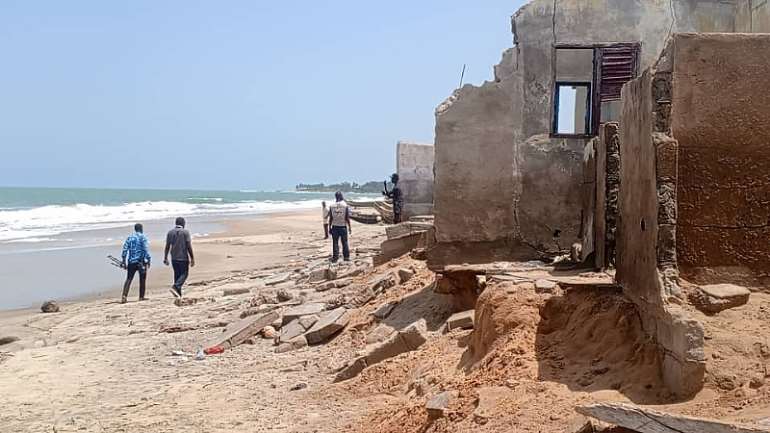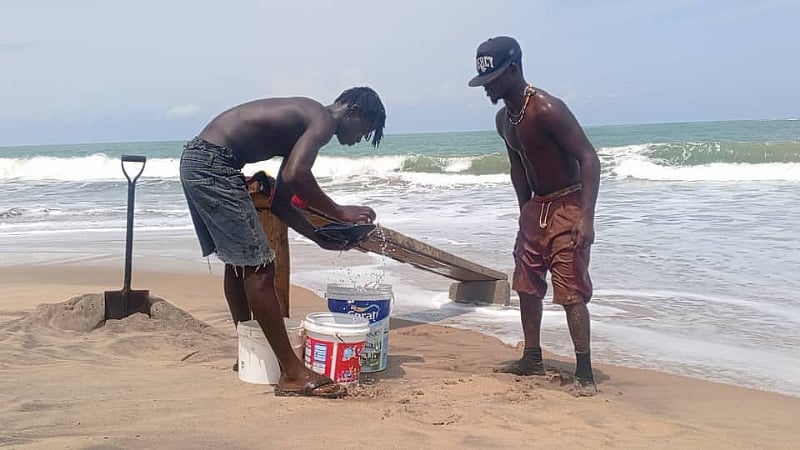The peaceful Coastal town of Brenu Akyinim, near Elmina in the Komenda-Edina-Eguafo-Abrem Municipality, has metamorphosed into a chaotic illegal mining scene with many children abandoning their education for galamsey.
With a very serene beachfront and known for its tourists attractions, the fishing community is rapidly transforming into an unregulated mining hub, driven by desperate unemployed youths.
At Brenu Akyinim M/A Basic School, nearly all 13 boys writing the Basic Education Certificate Examination (BECE), secretly engage in the hazardous practice of illegal mining, known locally as ‘galamsey’.
Meanwhile, 19 girls in the same class support these activities by fetching water for a fee, to ease their financial burden.
Under cover of darkness, these young miners earn between 100 and 200 cedis daily, labouring through the night along the community’s scenic beachfront while their teachers, unknowingly, catch some rest.
Students Reaction
Some students openly expressed joy about their new livelihood in separate interviews with the Ghana News Agency (GNA).
Seventeen-year-old Kojo (borrowed name) said, “School takes too long to make money. Here, I can earn some daily income to help my family put food on the table.
“Why wait years for a certificate when I can start working now?” he queried.
Similarly, 15-year-old “Ama” in the company of her mother told GNA, “My parents are poor and they depend on what I make every day from mining at night to fend for the family.
“I feel proud to support them. I plan to save enough to start my own business when I complete my BECE. Possibly, I will go into fish trading or set up a small shop.”
Two of the students lamented how pulling an all-nighter before school harms cognitive function, mood, physical health and academic performance.
Though they all complained about difficulty in concentrating in class, but were still resolute to engage in illegal mining to support themselves and family.
Their vows were corroborated by Mr Jefta Dadzie, the Headteacher of the school, who said the nocturnal toil of the students comes at a huge cost.
He lamented a sharp decline in attendance and academic performance, particularly, among the boys shortly after the BECE registration.
He said many students arrive at school usually appearing pale, weak and dizzy, and typically unable or unwilling to complete homework (assignments).
Grim Picture
Mr Dadzie painted a grim picture: “My students have become more money-driven and indifferent to their education. They’re not learning; they’re competing with adults for gold. They barely sleep.
“Buildings are collapsing in the area, yet these children seem oblivious to the devastating destruction,” he said, warning that this trend threatens not only the future of the children but also the community’s social fabric.
Mr Dadzie blamed the situation primarily to parental neglect, poverty, the perceived lack of employment opportunities after school, and disinterest in schooling.
He said many children come from poor families and start mining part-time to support themselves or their families financially, but the lure of quick money from illegal mining often outweighs the perceived long-term benefits of education.
Parents Tacit Support
A parent, Madam Abrefi, pointed out that some parents rely heavily on the income their children bring from mining despite the risks, thereby confirming the views of the Headteacher.
“I allow my children to engage in illegal mining not out of disregard for the law, but from fierce love and desperation to provide them with good education.
“Survival today can pave the way for a better tomorrow, even as some graduates wait in vain for opportunities.”
On the health front, the GNA’s visit to the community revealed a huge dangerously dug out trenches just 10 meters from the Brenu Akyinim CHPS compound, the only health centre serving over 1,000 residents in the area.
GNA observed that it was near collapse due to severe inland tidal erosion worsened by rampant beachfront mining.
Dr Martin Danko who is in charge of the facility stated that if the health centre falls, residents would have to travel miles to Elmina for basic care, undermining the CHPS system’s purpose.
He revealed that the all-female health officers at the facility face significant threats after appealing to miners to stop their destructive activities.
He highlighted a hidden health crisis with the illegal mining activities as the contamination of local water sources with mercury and arsenic used in gold extraction would lead to waterborne diseases like typhoid and diarrhoea, and severe health problems including kidney disease, respiratory illnesses, birth defects, and cognitive impairments.
The Assemblyman for the area, Mr Daniel Burknor Mensah, expressed deep concern over the trend, warning of long-term consequences for community development and health.
Despite public education campaigns, durbars, and arrests, children continue to leave school for hazardous mining.
“It pains me deeply to see our children abandon education to chase gold in dangerous illegal mines.
“This is not just a loss of schooling; it’s a loss of our community’s future. We must act urgently to protect these young lives before greed buries their dreams forever,” he said.
Mr Mensah also lamented the destruction of the beachfront and collapsing houses caused by illegal mining, which has ruined the coastline’s natural beauty and resilience, displaced residents, and undermined local economies and safety.

Conclusion
To reintegrate students who have abandoned school for illegal mining in Brenu Akyinim, stakeholders have recommended a comprehensive, multi-faceted approach.
Community Sensitization and Parental Education
Efforts should focus on raising community awareness and educating parents about the long-term benefits of education compared to the short-term gains from illegal mining.
Parents have a crucial responsibility to ensure their children attend school regularly by emphasizing the importance of education and discouraging the allure of quick money from mining.
Community leaders should also introduce sanctions for parents whose children engage in illegal mining to reinforce this accountability.
Support for students should be encouraged and supported to return to school. Vocational training programmes can offer alternative pathways to employment, especially for those facing academic challenges.
Collaborative Efforts
A coordinated effort among parents, schools, community leaders, and government agencies is essential to enforce laws preventing child involvement in illegal mining to foster an environment that prioritises education over mining activities.
This collaboration is vital to reversing the trend of school dropouts and securing a brighter future for the youth and the nation.
Additional Measures
Strengthening healthcare facilities to address mining-related illnesses, enforcing environmental regulations to protect water and land resources, and providing viable economic alternatives for youth are critical steps toward restoring social stability and promoting sustainable development in Brenu Akyinim.
GNA


